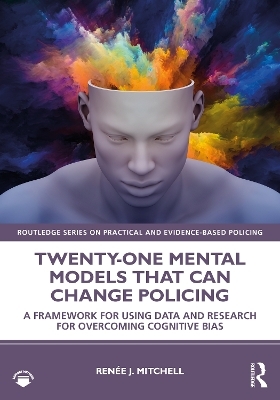
Twenty-one Mental Models That Can Change Policing
Routledge (Verlag)
978-0-367-48008-0 (ISBN)
While evidence-based practice is critical to advancing the police profession, it is limited in scope, and is only part of what is necessary to support sustainable change in policing. Policing requires a scientifically based framework to understand and interpret data in a way that minimizes cognitive bias to allow for better responses to complex problems. Data and research have advanced so rapidly in the last several decades that it is difficult for even the most ambitious of police leaders to keep pace. The Twenty-one Mental Models were synthesized to create a framework for any police, public, or community leader to better understand how cognitive bias contributes to misunderstanding data and gives the reader the tools to overcome those biases to better serve their communities.
The book is intended for a wide range of audiences, including law enforcement and community leaders; scholars and policy experts who specialize in policing; students of criminal justice, organizations, and management; reporters and journalists; individuals who aspire to police careers; and citizen consumers of information about policing. Anyone who is going to make decisions about their communities based on data has a responsibility to be numerate and this book Twenty-one Mental Models That Can Change Policing: A Framework For Using Data and Research For Overcoming Cognitive Bias, will help you become just that.
Renée J. Mitchell served in the Sacramento Police Department for twenty-two years and is currently a Senior Police Researcher with RTI International. She holds a B.S. in Psychology, a M.A. in Counseling Psychology, a M.B.A., a J.D., and a Ph.D. in Criminology from the University of Cambridge. She has taught and lectured internationally on evidence-based policing and is best known for being the first policing pracademic to run a randomized controlled trial. She was a Fulbright Police Research Fellow and is the co-founder and executive committee member of the American Society of Evidence-Based Policing. She has two TEDx talks, "Research Not Protests" and "Policing Needs to Change: Trust me I’m a Cop," where she advocates for evidence-based policing. She has published her research in the Journal of Experimental Criminology, Justice Quarterly, and the Cambridge Journal of Evidence-Based Policing. Her books include Evidence Based Policing: An introduction and Implementing Evidence-Based Research: A How-to Guide for Police Organizations.
Introduction: What is a Mental Model and How Does It Help Policing; PART I: How We Think; Mental Model #1: System 1 and 2; Mental Model #2: Cognitive Bias; Mental Model #3: First Principles Thinking; The Mental Models in Practice I: Mental Models 1-3; Part II: How We Think About Math; Mental Model #4: False Linear Thinking; Mental Model #5: Binary Percent Changes; Mental Model #6: Second Order Thinking; The Mental Models in Practice II: Mental Models 4-6; PART III: How Things Concentrate; Mental Model #7: Pareto Principle; Mental Model #8: The Law of Crime concentration; Mental Model #9: Felonious Few; The Mental Models in Practice III: Mental Models 7-9; PART IV: How Things Vary; Mental Model #10: Distributions; Mental Model #11: Law of Large numbers; Mental Model #12: Regression to the Mean; The Mental Models in Practice IV: Mental Models 10-12; PART V: How to Determine Causality; Mental Model #13: Correlation is not Causation; Mental Model #14: Causal Inference; Mental Model #15: Bayesian (Probabilistic) Reasoning; The Mental Models in Practice V: Mental Models 13-15; Part VI: How to Think Scientifically; Mental Model #16: Peer Review Your Perspectives; Mental Model #17: The Scientific Method; Mental Model #18: Evidence-based Practices; The Mental Models in Practice VI: Mental Models 16-18; PART VII: How to Make Decisions; Mental Model #19: Targeting, Testing, and Tracking; Mental Model #20: Harm Indexes; Mental Model #21: Decision-making Models; The Mental Models in Practice VII: Mental Models 19-21; PART VIII: How to Apply it All; Conclusion: How the Twenty-one Mental Models Can Improve Policing and Reduce Cognitive Bias; Mental Model Method: How it all Fits Together Mental Models 1-21; Notes
| Erscheinungsdatum | 17.09.2021 |
|---|---|
| Reihe/Serie | Routledge Series on Practical and Evidence-Based Policing |
| Zusatzinfo | 17 Tables, black and white; 45 Line drawings, black and white; 1 Halftones, black and white; 46 Illustrations, black and white |
| Verlagsort | London |
| Sprache | englisch |
| Maße | 178 x 254 mm |
| Gewicht | 400 g |
| Themenwelt | Recht / Steuern ► Strafrecht ► Kriminologie |
| Wirtschaft ► Betriebswirtschaft / Management ► Planung / Organisation | |
| Wirtschaft ► Betriebswirtschaft / Management ► Unternehmensführung / Management | |
| Wirtschaft ► Volkswirtschaftslehre | |
| ISBN-10 | 0-367-48008-5 / 0367480085 |
| ISBN-13 | 978-0-367-48008-0 / 9780367480080 |
| Zustand | Neuware |
| Haben Sie eine Frage zum Produkt? |
aus dem Bereich


